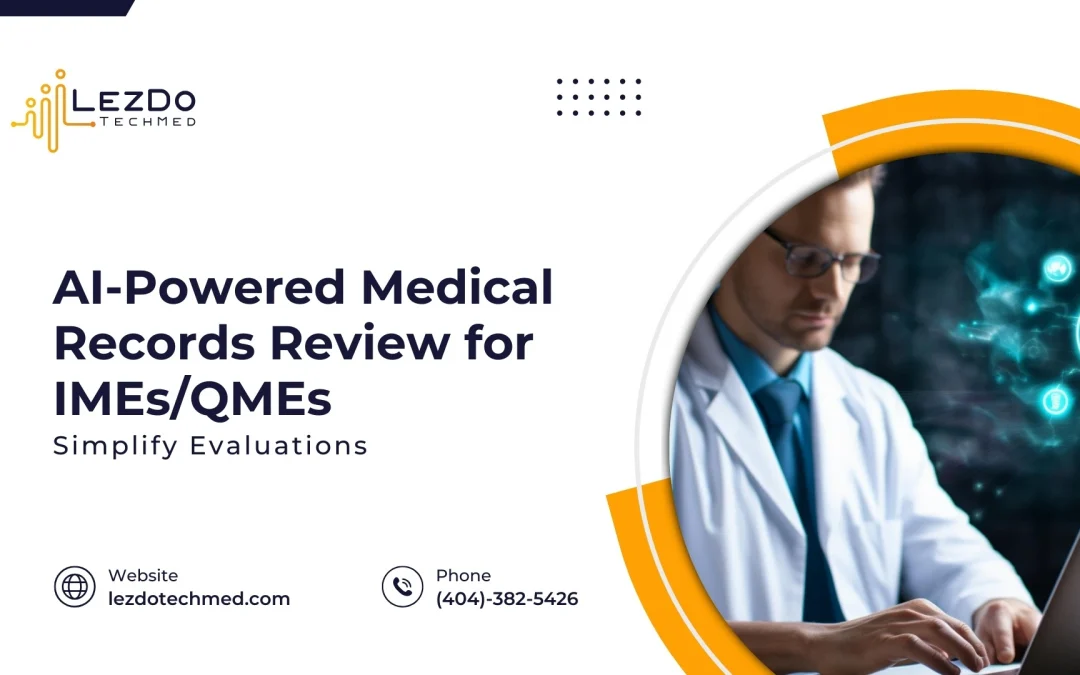In the era of evidence-based medicine, medical peer review stands as a pillar of quality assurance, guiding and empowering the healthcare and legal sectors. These rigorous processes form an essential component of medical record review services, providing insightful perspectives and expert opinions that inform critical decision-making.
Ready to get started? Get free trial worth $500. Hurry up!
The Mechanics of Medical Peer Review
What is a peer-to-peer medical review? Medical peer review is a systematic review process conducted by healthcare professionals of the same specialty. The evaluation assesses the appropriateness, quality, and cost-effectiveness of treatment provided by other practitioners using accepted norms and recommendations.
Medical peer reviews can otherwise be noted as clinical peer reviews or physician peer reviews.
What is the purpose of peer reviews? Deviations from the established standard of care or perceived instances of inferior quality care often incite complaints from patients. Additionally, grievances can stem from fellow healthcare professionals, typically triggered by concerns related to patient safety. A medical management clinical peer review helps facilities avoid such scenarios.
It is a crucial tool for evaluating medical necessity, exploring treatment options, ensuring compliance, and assessing the reasonability of charges associated with care in such instances.
The clinical peer review process is instrumental in preserving the standards and reliability of healthcare services, fostering an atmosphere of responsibility and persistent enhancement. This collaborative examination of healthcare procedures by medical professionals, often referred to as peer-to-peer medical review, promotes standardization, and the sharing of best practices within the medical community.
However, it also plays pivotal roles in other sectors like insurance and legal.
Insurance Sector: It’s crucial for validating medical claims, ensuring accurate reimbursements, and detecting potential fraud.
Legal Sector: It’s used for objective analysis and expert testimony in malpractice, personal injury, and workers’ compensation cases.
Medical Peer Review and Insurance Claims
What is a peer to peer review for insurance? Peer to peer review is done by medical claims review services for insurance in order to evaluate the reasonability of cares provided. In the intricate world of insurance, the utilization of peer to peer medical insurance review services has become an indispensable asset in validating and managing insurance claims. These medical claims reviews provide a balanced, fair, and evidence-based perspective in assessing the validity and reasonability of treatments related to these claims.
With expert peer to peer review insurance firms can avoid additional and unnecessary financial burden by identifying fradulent claims. Insurance peer-to-peer reviews facilitate direct communication between treating physicians and insurers to resolve coverage disputes and ensure proper medical treatment is approved.
Assessing Need and Reasonability of Treatments
The fundamental aspect of insurance peer review resides in the systematic and detailed evaluation of medical records related to a claim. Reviewers, who typically are specialized healthcare professionals, scrutinize the given treatment, diagnosis, and carried out procedures. They gauge whether these aspects conform to accepted medical standards and guidelines for the specific condition or disease treated.
Furthermore, this process involves examining the necessity and suitability of the provided care. Medical claims peer reviewers delve into whether the care delivered was necessary and suitable, given the patient’s health condition. They identify any superfluous tests or procedures, watch out for overtreatment, and ensure the implementation of the most cost-effective, evidence-based treatment plan.
Assuring Transparency and Fairness in Reimbursement
Medical peer reviews ensure a transparent and unbiased evaluation, which forms the basis for fair reimbursement. Insurers can confidently rely on the findings of these reviews to settle claims.
By analyzing the necessity, appropriateness, and reasonability of treatments, insurers can ensure that they reimburse for services genuinely needed and appropriately delivered, and that the cost aligns with established norms for the specific healthcare services rendered. This process curtails potential overpayment and avoids underpayment, ensuring fairness for both the claimants and the insurance providers.
In this way, peer to peer insurance reviews have become an essential service for insurance providers, ensuring fairness, promoting cost-effectiveness, and upholding the quality of healthcare services.
Role of Physician Peer Review Attorneys
Medical peer review attorneys play a vital role in supporting physicians during the peer review process, which can often be stressful and complex. These attorneys provide legal guidance to ensure that physicians’ rights are protected, especially when facing allegations related to malpractice, professional misconduct, or quality-of-care concerns.
The physician peer review lawyers help physicians understand the procedures, prepare necessary documentation, and represent them in hearings to ensure a fair and unbiased review. With their expertise, medical peer review attorneys help safeguard physicians’ professional reputations and careers, allowing them to focus on their medical practice without the added stress of legal uncertainties.
How does Medical Peer Reviews Assist Attorneys?
In the complexities of the legal field, medical peer reviews serve as an invaluable compass, guiding attorneys towards more confident and potent litigation strategies. These personal injury assist reviews are particularly crucial in cases that dwell at the intersection of law and medicine, such as medical malpractice lawsuits.
When a case hinges on intricate medical facts or complex healthcare practices, attorneys often rely on expert medical opinions to substantiate their arguments. This is where peer to peer medical reviews come into play. By conducting a thorough, unbiased examination of medical records and assessing these against established standards of care, peer reviewers shed light on key case factors.
Standard of Care
It is crucial to determine whether the healthcare professional departed from the accepted standards of care in a medical malpractice litigation. A medical peer reviewer can objectively analyze the treatment procedures, diagnostic tests, and health outcomes documented in the medical records to identify any discrepancies or lapses in the standard of care provided.
Strengths and Weaknesses
Medical peer review can help to identify and assess the strengths and weaknesses of a medical case. This can be important in determining whether to file a lawsuit and in developing a legal strategy. For example, an attorney may use medical peer review to identify any potential gaps in the patient’s medical records. This information can then be used to develop a legal strategy to fill in these gaps and strengthen the case.
Potential Injuries
Medical peer review can help to enlighten attorneys about the medical aspects of a case. This can be important in understanding the potential damages that the patient has suffered and in developing a legal strategy. For example, an attorney may use medical peer review to learn about the long-term effects of a patient’s injuries. This information can then be used to argue for a higher level of damages.
Causation of Damage
In personal injury cases, the issue of causation – whether the injury was indeed caused by the incident in question – often forms the crux of the case. Medical peer reviews can offer compelling evidence in this regard, assessing the correlation between the incident and the injuries or health conditions that ensued.
Reasonability of Treatment
Medical peer reviews can also assist in quantifying the extent of harm or injury suffered by the claimant, and in determining the reasonableness of the medical costs incurred. This insight can be pivotal in negotiating settlements or arguing damages in court.
The evidence and expert opinion furnished by a thorough medical peer review, therefore, arm the attorney with a robust body of substantiating material, significantly enhancing the persuasiveness of their case. This empowers attorneys to navigate their legal battles more effectively, advocating for their clients’ rights and interests with greater vigor and conviction.
Role of Medical Peer Review Services
Many medical record review companies in the United States provide medical peer review services too. They have dedicated teams of medical professionals equipped with profound clinical expertise and sharp perception. They deliver flawless reviews that embody unbiased, thorough, and well-documented evaluations.
For insurance providers, they aid in the rigorous scrutiny of insurance claims, thereby guaranteeing that only justifiable and necessary treatments are covered. In addition, these physician peer review firms assist healthcare professionals in generating their medical peer review reports for insurance firms.
Additionally, these medical peer review companies partner with attorneys, equipping them with compelling evidence to strengthen their lawsuits. These experts accurately scrutinize medical histories, assess treatment plans, and highlight any inconsistencies, thereby reinforcing the case for the attorneys.
To jot down ultimately, the importance of medical peer review in personal injury lawsuits and insurance claims cannot be overstated. It serves as the cornerstone of quality assurance, making sure that medical professionals uphold the highest standards of care, help insurance providers assess claim reasonability and assist attorneys build strong lawsuits. These physician peer review companies, thus, supports legal, medical and insurance professionals in their respective fields.











